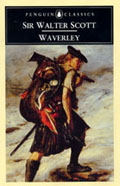Sir Walter Scott's first novel, Waverley, was a huge hit. Let me repeat that: This book was a huge hit. That is quite an amazing fact--almost as amazing as the fact that I somehow made it through this rambling, horrid turd of a book.
Why did people love Waverley so much? It promises a rousing adventure tale: Edward Waverley, a young and diffident nobleman, joins a company of English military dragoons in Scotland, yet finds himself drawn to the charismatic rebel Fergus Mac-Ivor and his beautiful sister, Flora. Eventually he forsakes his regiment to join with the rebels, who are about to stage a military campaign to put Prince Charles, the heir of the Stuart line deposed in 1688, on the British throne.
The first problem is that the book never really delivers on this promise, preferring interminable passages of exposition and terrible Gaelic poetry to actual battle scenes. The second problem is that Waverley himself is about as engaging as a plate of haggis. And yet everyone in this book, Brit and Scott, Whig and Tory, Anglican and Presbyterian, is constantly heaping praise on him, despite his general lack of personality and absence of actual achievement, military or otherwise.
Scott goes to great lengths to depict Waverley as someone who reads too much, and gets carried away in his "own romantic tone and colouring." That's the reason he gets so caught up in the cause of the Scottish rebels. But Scott's is a winking criticism, because the novel romanticizes the Scots as much as the protagonist himself does, and Waverley's romantic notions in practice only make people more affectionate toward him. The earnestness, in fact, that marks the relationship between Waverley and Fergus--and for that matter Waverley and everyone else--is noxious. Let's call that the third problem. Naturally, Waverley never receives any real punishment for joining the rebels (who Scott's readers would know failed in their attempts to restore the Stuart line) and only comes out of the ordeal preposterously more respected. Scott even supplies a noble English captain who is captured by the Scots, just so he can blather on about how gallant Waverley is despite what is technically capital treason.
The fourth problem is that Waverley contains sentences like this one:
He was about to proceed, but Callum Beg said, rather pertly as Edward thought, that "Ta Cean Kinne did not like ta Sassenagh Duinhe-wassal to be pingled wi' mickle speaking, as she was na tat weil."
Scott means this impenetrable Scot dialect to be funny, but it's just exasperating, from the first instance to the thousandth.
And yet, people loved this book--even Jane Austen. It was the Da Vinci Code of its day. The history and the politics were probably more relevant to them, and even though the dialect would have been just as inscrutable to Scott's English audience, the depiction of the Scottish Highlanders would probably have accessed both some fascination toward their exoticness and a nostalgia for the outdated modes of gentility they embody, neither of which is available to an American today. Waverley is, at the very least, a reminder that the past is a very strange country indeed.


1 comment:
Waverley is one of the best by Sir Walter Scott. I cannot agree more that there are some problems that disctract from reading, but in sober fact it is essential for author's writing style.
Post a Comment